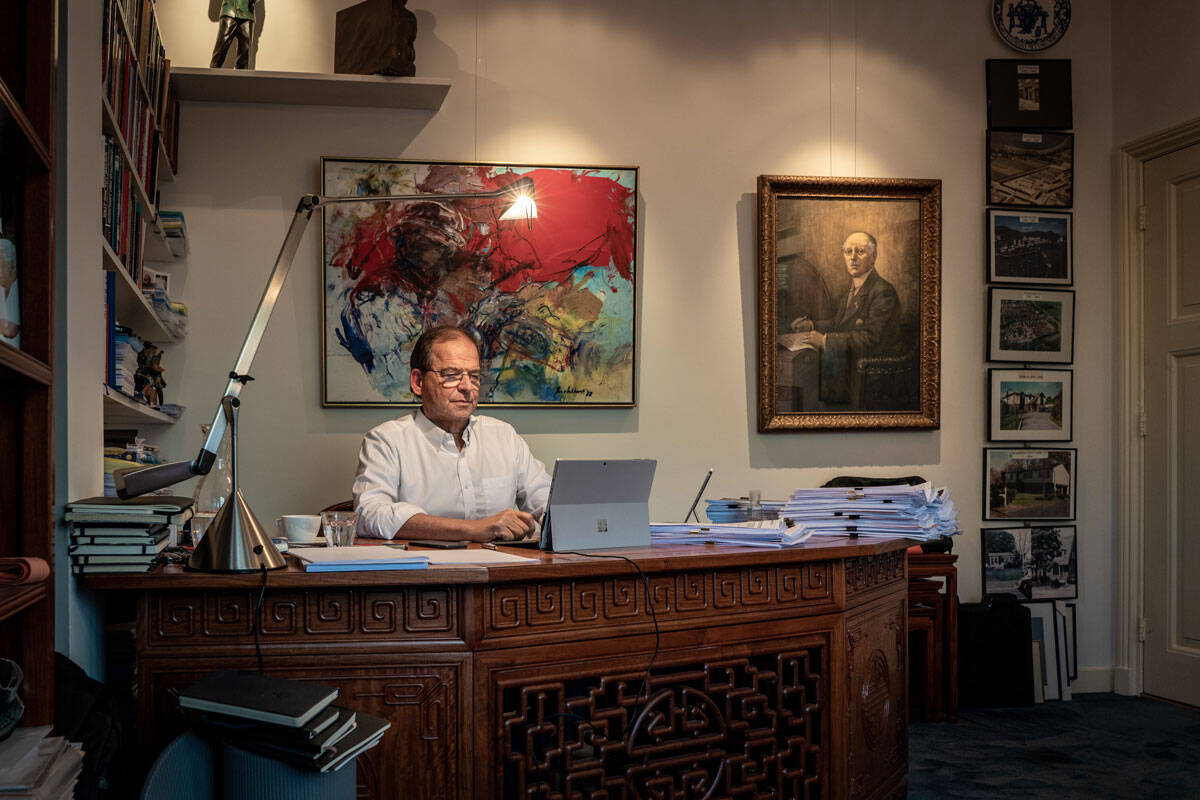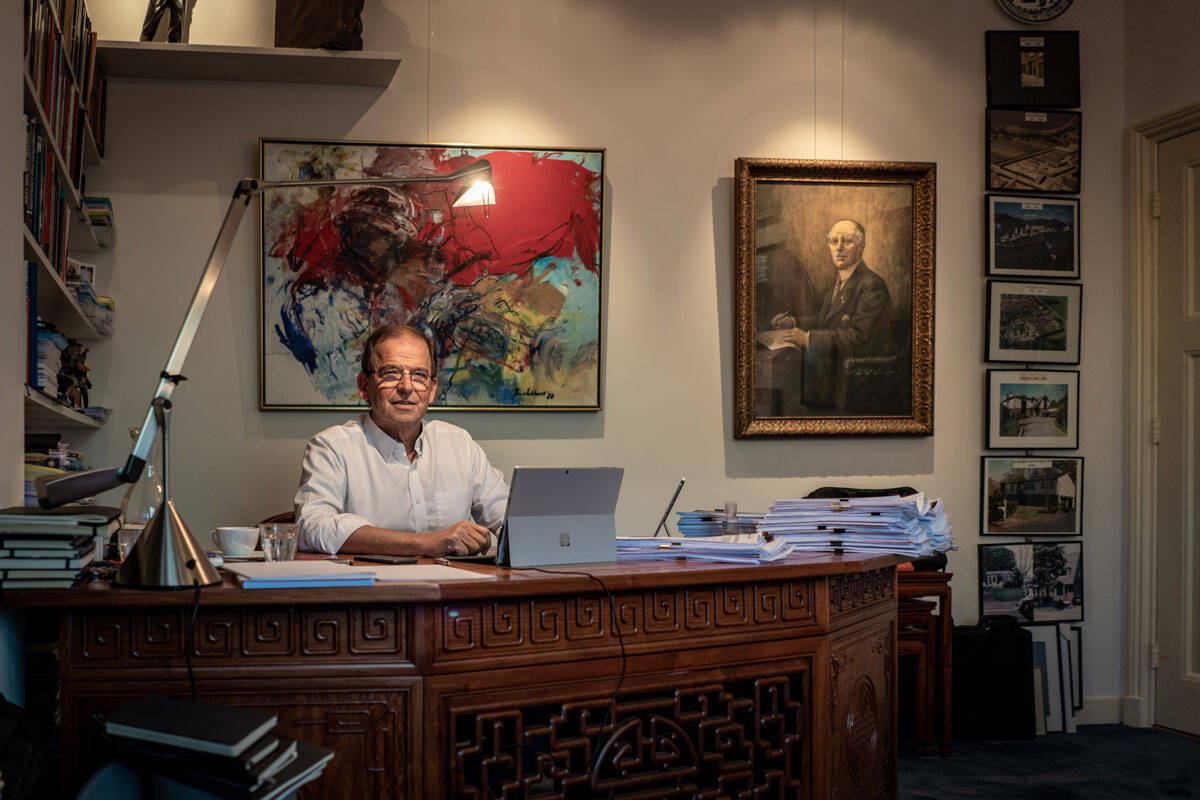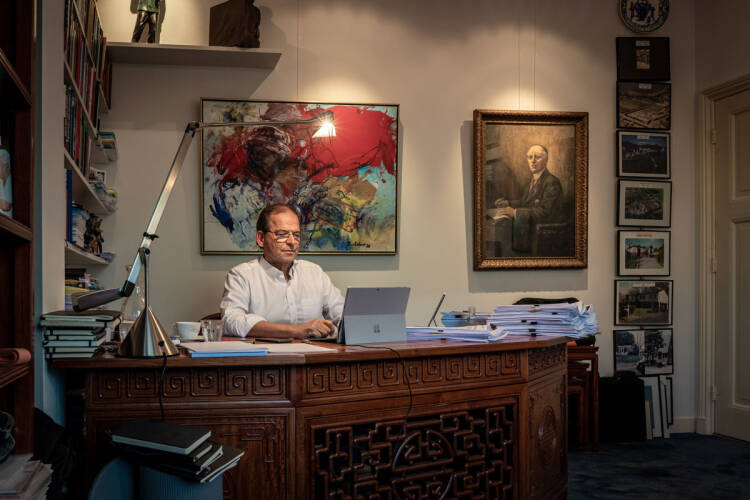Future Foods
Unilever Food Solutions does not only want to contribute to a more sustainable food system in the field of resourcing. In November 2020, the company launched the Future Foods initiative, where the company committed itself to the growth of sales in the field of plant-based meat and dairy alternatives and aims to halve food waste. From this program, Unilever Food Solutions focuses on two goals: helping people to switch to healthier food, and reduce the environmental impact of the global food chain.
It was recently announced that Brouwer will resign from his position at Unilever Food Solutions on 1 January 2021. Star Chen will succeed him.
How do you view 2021?
“By mid-2020, we thought everything would be fine again in 2021. Now we realise that the virus will not suddenly disappear by January 1, which makes 2021 a challenging year as well. Still, I hope the crisis will result in a lasting appreciation of our food’s origin, seasonality and the effort it takes to harvest it. And that we gain more respect and attention for local producers as a result. And I hope that "forced" cooking and eating together leads to lifelong cooking skills. One possible side effect of adults and children getting their hands dirty in the kitchen is that it will raise awareness of what a meal consists of. Ultimately, this can lead to better food choices. I especially hope that people will be happy to interact with their loved ones over a good meal."
Is resourcing ingredients locally financially driven?
“No, UFS has been investigating long term solutions for a more sustainable food system for many years. Since 2015 this has been included in the mission statement of the Enhancing Livelihoods Fund (ELF), a joint 5-year initiative of Unilever, Oxfam and the Ford Foundation. Globally almost 450 million people earn the largest part of their income via a small family owned business. They are vital for the environment and play a crucial role in the protection and the regeneration of the land they know so well. And we are all dependent on them for our food. Yet, these small-scale farmers belong to the group of poorest people in the world. Many live off less than 2 dollars a day and in some places these small-scale farmers leave their land to find luck elsewhere. The people that grow our crops and produce our ingredients are essential for our future. We have to make agriculture economically and ecologically sustainable and enable a new generation of regular and small-scale farmers to do so."
Soon there will be a vaccine, so you can revert to the old procedures. Why all this effort?
“Absolutely not. We are not going back. This was a process we should have started a lot earlier. It is utterly ridiculous that we ship ingredients across the globe while they are also produced locally. The coronavirus crisis made our company realise that it is urgent and necessary to initiate this process right now. In this respect I am actually happy the coronavirus made us aware of our responsibilities and accelerated this process. Were it not for the virus, our relocalization process would not be where it is now.”
How do you resource locally for a global company?
“Previously we shipped many of our products’ ingredients around the world. Since COVID-19 we were getting a different view on the goods supply chain. First we focus on obtaining the ingredients as local as possible. For each composite product we first check the possibility to acquire the raw materials locally. Only if that is not possible, because the ingredient is not locally produced, we are looking across the border. This seems simple, but for a global company, which is what we are, with thousands of products, it is pretty complicated and time consuming to rewrite all our recipes that way. Fortunately, because we are a global company, we have many people to help. The process is not finalised yet but we are almost there."

What did you do?
"There wasn’t much discussion about the virus in the Netherlands and the rest of Europe, but together with the Chinese team, we immediately started to rewrite all the recipes by replacing all the ingredients with locally available ingredients so we didn’t need foreign import. Not only for the products on the Chinese market, but for all products worldwide."
When did you realise that instead of being the best, it might even become the worst year ever for Unilever Food Solutions?
“China is our largest market of sales outlet. More than 1000 people are employed there for Unilever Food. The largest brand for Unilever in China is Unilever Food Solutions. Obviously we interact a lot with China. In January we heard things were getting out of control in China. Because I wanted to understand what precisely was going on in China and our company over there I virtually attended a medical conference where doctors explained how the virus was spreading exponentially around the world. After a few hours I knew about all there was to know about coronavirus at the time. I realised the virus would not only affect our business in China, but our entire business globally."

What was the company’s situation like at the beginning of this year?
"In January we traditionally hold a global meeting where we present our plans for the coming year. I remember on the 10th of January, we told each other as board members: ‘This is going to be the best year ever’. We invested in a lot of new categories, digitisation and healthier products. We could feel it: this year everything would come together. We planned a growth of 10 percent for the whole organisation. We were in high spirits."
Unilever Food Solutions (UFS) is part of Unilever. The company creates products for food services and the hospitality business. The food service branch was founded in 1927. The brands Knorr Professional, Hellman’s, De Vegetarische Slager and Lipton are produced under the flag of UFS amongst many others. UFS supplies to restaurants, caterers, hotels and similar businesses. The company is active in 77 countries and has more than 4,000 employees.

Maaike de Reuver Oene Sierksma Wouter Noordijk
Unilever Food Solutions is one of the largest food service companies in the world. Seemingly, there couldn’t be a more global business. Nevertheless, Unilever’s food service branch decided to go more local. The coronavirus opened their eyes and showed the company that globalization is not always the best option. Food Inspiration spoke to CEO Harry Brouwer about relocalization.
One of the world's biggest food service companies is localizing
interview
5 min
An interview with CEO Unilever Food Solutions
one of the worlds biggest food service companies is localising

It was recently announced that Brouwer will resign from his position at Unilever Food Solutions on 1 January 2021. Star Chen will succeed him.
Future Foods
Unilever Food Solutions does not only want to contribute to a more sustainable food system in the field of resourcing. In November 2020, the company launched the Future Foods initiative, where the company committed itself to the growth of sales in the field of plant-based meat and dairy alternatives and aims to halve food waste. From this program, Unilever Food Solutions focuses on two goals: helping people to switch to healthier food, and reduce the environmental impact of the global food chain.
How do you view 2021?
“By mid-2020, we thought everything would be fine again in 2021. Now we realise that the virus will not suddenly disappear by January 1, which makes 2021 a challenging year as well. Still, I hope the crisis will result in a lasting appreciation of our food’s origin, seasonality and the effort it takes to harvest it. And that we gain more respect and attention for local producers as a result. And I hope that "forced" cooking and eating together leads to lifelong cooking skills. One possible side effect of adults and children getting their hands dirty in the kitchen is that it will raise awareness of what a meal consists of. Ultimately, this can lead to better food choices. I especially hope that people will be happy to interact with their loved ones over a good meal."
Is resourcing ingredients locally financially driven?
“No, UFS has been investigating long term solutions for a more sustainable food system for many years. Since 2015 this has been included in the mission statement of the Enhancing Livelihoods Fund (ELF), a joint 5-year initiative of Unilever, Oxfam and the Ford Foundation. Globally almost 450 million people earn the largest part of their income via a small family owned business. They are vital for the environment and play a crucial role in the protection and the regeneration of the land they know so well. And we are all dependent on them for our food. Yet, these small-scale farmers belong to the group of poorest people in the world. Many live off less than 2 dollars a day and in some places these small-scale farmers leave their land to find luck elsewhere. The people that grow our crops and produce our ingredients are essential for our future. We have to make agriculture economically and ecologically sustainable and enable a new generation of regular and small-scale farmers to do so."
Soon there will be a vaccine, so you can revert to the old procedures. Why all this effort?
“Absolutely not. We are not going back. This was a process we should have started a lot earlier. It is utterly ridiculous that we ship ingredients across the globe while they are also produced locally. The coronavirus crisis made our company realise that it is urgent and necessary to initiate this process right now. In this respect I am actually happy the coronavirus made us aware of our responsibilities and accelerated this process. Were it not for the virus, our relocalization process would not be where it is now.”

How do you resource locally for a global company?
“Previously we shipped many of our products’ ingredients around the world. Since COVID-19 we were getting a different view on the goods supply chain. First we focus on obtaining the ingredients as local as possible. For each composite product we first check the possibility to acquire the raw materials locally. Only if that is not possible, because the ingredient is not locally produced, we are looking across the border. This seems simple, but for a global company, which is what we are, with thousands of products, it is pretty complicated and time consuming to rewrite all our recipes that way. Fortunately, because we are a global company, we have many people to help. The process is not finalised yet but we are almost there."
What did you do?
"There wasn’t much discussion about the virus in the Netherlands and the rest of Europe, but together with the Chinese team, we immediately started to rewrite all the recipes by replacing all the ingredients with locally available ingredients so we didn’t need foreign import. Not only for the products on the Chinese market, but for all products worldwide."
When did you realise that instead of being the best, it might even become the worst year ever for Unilever Food Solutions?
“China is our largest market of sales outlet. More than 1000 people are employed there for Unilever Food. The largest brand for Unilever in China is Unilever Food Solutions. Obviously we interact a lot with China. In January we heard things were getting out of control in China. Because I wanted to understand what precisely was going on in China and our company over there I virtually attended a medical conference where doctors explained how the virus was spreading exponentially around the world. After a few hours I knew about all there was to know about coronavirus at the time. I realised the virus would not only affect our business in China, but our entire business globally."

What was the company’s situation like at the beginning of this year?
"In January we traditionally hold a global meeting where we present our plans for the coming year. I remember on the 10th of January, we told each other as board members: ‘This is going to be the best year ever’. We invested in a lot of new categories, digitisation and healthier products. We could feel it: this year everything would come together. We planned a growth of 10 percent for the whole organisation. We were in high spirits."
Unilever Food Solutions (UFS) is part of Unilever. The company creates products for food services and the hospitality business. The food service branch was founded in 1927. The brands Knorr Professional, Hellman’s, De Vegetarische Slager and Lipton are produced under the flag of UFS amongst many others. UFS supplies to restaurants, caterers, hotels and similar businesses. The company is active in 77 countries and has more than 4,000 employees.

Maaike de Reuver Oene Sierksma
Wouter Noordijk
Unilever Food Solutions is one of the largest food service companies in the world. Seemingly, there couldn’t be a more global business. Nevertheless, Unilever’s food service branch decided to go more local. The coronavirus opened their eyes and showed the company that globalization is not always the best option. Food Inspiration spoke to CEO Harry Brouwer about relocalization.
An interview with CEO Unilever Food Solutions
One of the world's biggest food service companies is localizing
5 min









